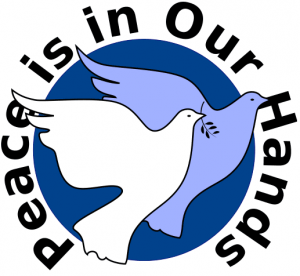
To fight or to take a pacifist line is one of the deepest and starkest choices of personal conscience. Is pacifism a cause worth fighting for? I write as one who has a fairly volatile temperament at times, and one who is not a naturally pacific person. Yet I am deeply impressed by the realisation that we are all human beings, given life by God. What right have others to take that life away? What cause can possibly justify it?
A friend of mine sums up the arguments for and against pacifism as follows:
“The fence on which I seem to sit is this:
- that I am dedicated to the proposition that love will ultimately (but not consistently or progressively) triumph over hate.
- That by the same token peace will triumph over war – but not consistently or progressively.
- That there are some things one must do, not believing in their success, but because doing them is essential to one’s integrity (actually I’d say ‘for the sake of my soul’)
- I know quite well that my blood can be fired by the beat of a drum or the skirl of pipes – just as I can be moved by ‘Last night I had the strangest dream’. I am not one of the world’s instinctive herbivores.”
It is the responsibility of the living to make meaningful the sacrifices of the dead. Most wars are allegedly fought to bring peace – a most ingenious paradox! We should pledge ourselves to make our world a better place – to end all wars, to relieve world debt, to feed the hungry, to find a cure for AIDS, to stop destroying our environment. It is still a beautiful planet, or it could be, if we could only learn to live together in peace.
Haiku
Peace, the deep serenity
Of being at one
With yourself and God.
Dreaming?
I dream of a world that’s free of insanity:
No hatred or fear, no screaming in pain;
No armies colliding, but peace and serenity.
I dream of a world of freedom sustained.
I dream of a world that’s free of man’s vanity:
No arrogant sneers, no scheming for gain;
No heartless deriding, but caring fraternity.
I dream of a world of reason attained.
I dream of a world that’s full of humanity:
Of kindness sincere and love unconstrained;
No abyss dividing, but living in unity.
I dream of a world where tolerance reigns.
Kath Forder, 2006
Not ours alone!
Not ours alone! These lands
are shared with other life,
with longer roots in time.
Our greedy, grasping hands
must not their needs deprive.
Not ours alone! These seas
are thronged with creatures strange,
a universe within.
Our needy, groping hands
must not their world derange.
Not ours alone! This air
is all the world’s supply,
the breath for all its life.
Our busy, choking hands
must not their lives deny.
Not ours alone! This Earth
is all creation’s joy;
she’s mother to us all.
Our crazy, grabbing hands
must not this Earth destroy.
Kath Forder 2007
War and Peace
I was 4½ in September 1939. A child of war, you may say. Memories abound. Children’s hour, Uncle Mack and Toy Town. The Battle of Britain. Churchill’s speeches to the nation, cryptic messages before the 6 o’clock news. Barrage balloons, air raid sirens, nights in the Anderson shelter, the night sky red from the glow of Birmingham ablaze.
Looking down from Beacon Hill on the black, green and beige camouflaged roofs of the Austin factory at Longbridge. The day the Luftwaffe tried to find it and the strafing along the Bristol Road.
Tobruk, El Alamein, GIs, gum and candy. Salerno, Anzio, D-Day, Caen, Arnhem, ultimate victory and surrender.
Belsen, Buchenwald, Ravensbruck, Auschwitz. The Nuremberg trials where some of the guilty were tried and convicted.
One or two years later, when, as a member of the school Cadet Force, being inspected on separate occasions by Fields Marshal Montgomery and Slim, architects and deliverers of victory.
A young trainee teacher coming into the lecture room and saying that there would be no science lesson today, “I am going to tell you about the Atomic Bomb.” As an RAF officer, he had been to Hiroshima and had seen the devastation.
And what of peace?
Statesmen of vision striving to ensure that the mistakes of Versailles would not be repeated, and that no power-hungry fanatic could ever again wreak havoc in Western Europe.
A just war and a just peace.
If you travel to Italy, and happen to visit Monte Cassino, spare an hour to go to the War Cemetery in the village at its foot. Soldiers from all corners of the old Empire are commemorated there. Men of every hue, race, religion and creed, who, united in a common cause, died so that we could be given the opportunity to live our lives in peace and to follow our beliefs in a free and open society.
John Chandler